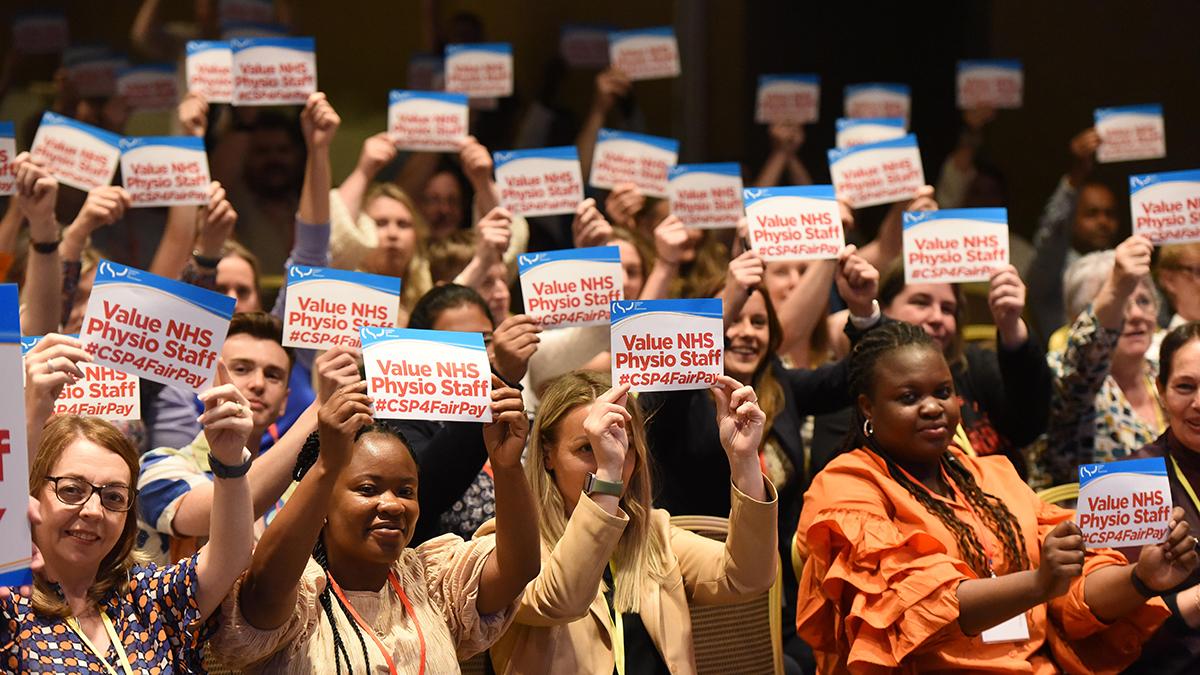NHS physiotherapy staff in Scotland have voted in favour of strike action in their first ever ballot on pay, the CSP has announced.

The national ballot, run 4 to 31 October, saw CSP members - pushed to the brink by an NHS retention and recruitment crisis - balloted nationally over pay for the first time in the Society's history.
79 per cent of cast votes were in favour of strike action and 90 per cent in favour of other industrial action short of a strike (ASOS). The national turnout for the ballot was 63 per cent.
Next Steps
Following our postal ballot, the CSP now has a six-month mandate for industrial action within those employers that passed the legal thresholds outlined below.
The Scottish Government announced a new offer just before the close of our ballot. The CSP has already expressed concern over the new offer, which seeks to be divisive both within and between unions. While better than the original offer for lower paid staff, it is significantly below inflation for many, in particular the experienced clinicians currently in short supply.
Our elected member pay group met on 31 October and determined the membership should decide our approach - and will now seek views on the revised offer.
We will therefore shortly be starting a digital consultation. This means we will currently not be calling members to take industrial action, but will keep this under review during and following the consultation.
We will continue to work in collaboration with other health unions, many of which are also beginning consultation processes.
Alex MacKenzie, chair of CSP council, said:
These results are a clear reflection of the anger and disillusionment felt by our members working in the NHS in Scotland.
We are working under extreme pressure, caused in no small part by a workforce crisis that threatens to be exacerbated by a pay offer so far below inflation.
It's incredible that instead of responding to those pressures with a constructive offer, the Scottish government came out last week with a new offer that not only still falls far short of our claim but also leaves some staff significantly worse off than under the original offer.
That this was our first ever ballot on pay demonstrates how reluctantly we pursue this path, but we feel we have no choice in the face of an offer that will cause such damage to living standards and our ability to recruit and retain staff.
This was a vote to protect the quality of care the NHS can offer to patients and we strongly urge the Scottish Government to return to the table with a fair offer for all.
Details will follow shortly regarding our plans - keep in touch with the latest developments via your workplace representatives and our digital news channels.
Employer-level results
The CSP's Scottish pay vote was run on a disaggregated basis - with each employer counted as a separate ballot.
- At least 50 per cent of those eligible to vote must do so (i.e. in the below figure the 'Yes', 'No', 'Spoilt' and 'Blank' segments taken together must meet 'T1').
- Those voting in favour of industrial action must amount to at least 40 per cent of all those eligible to vote (i.e. the 'Yes' segment must meet 'T2').
- These thresholds are additional to the requirement that more than half of cast votes must be in favour of industrial action (i.e. the 'Yes' segment must exceed the 'No', 'Spoilt' and 'Blank' segments taken together).
16 of the 18 of employers balloted returned a yes vote for strike action and cleared both these additional thresholds, imposed by the 2016 Trade Union Act.
17 of the 18 employers balloted returned a yes vote for action short of a strike (ASOS) and cleared both additional thresholds.
In total, 2454 of the Society's 2762 members in-scope of our ballot (92 per cent) work for an employer where we now have a legal mandate to pursue strike action. 2755 members (over 99 per cent) work for an employer where we have a mandate for action short of a strike.
Elsewhere in the UK
- The CSP's national pay ballots in England and Wales will run November 7 to December 12. Support the vote in your workplace, community & online - download & display our print at home and digital resources.
- Our pay sub-group also considered the results of our consultation of members employed within Health & Social Care Northern Ireland. Further details to follow.
Number of subscribers: 2